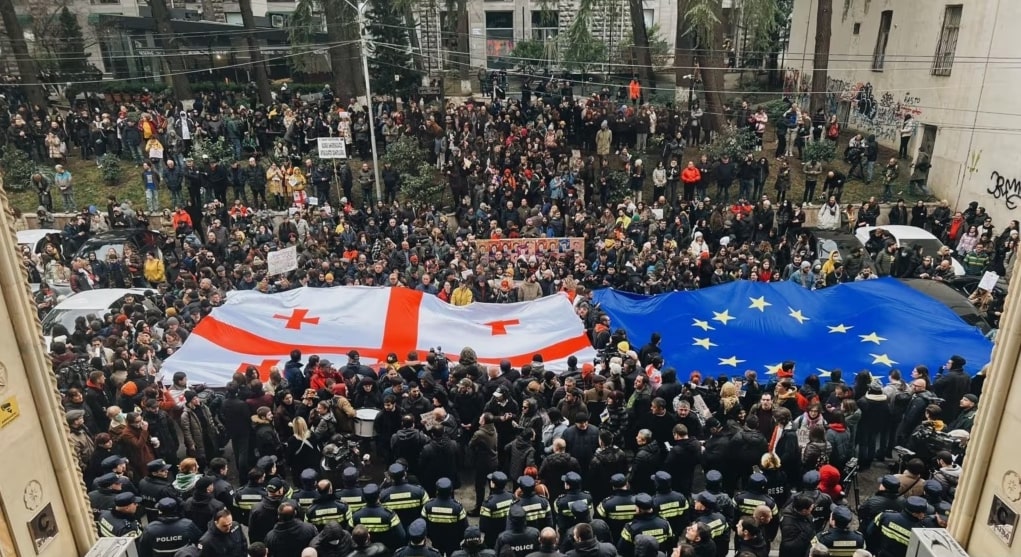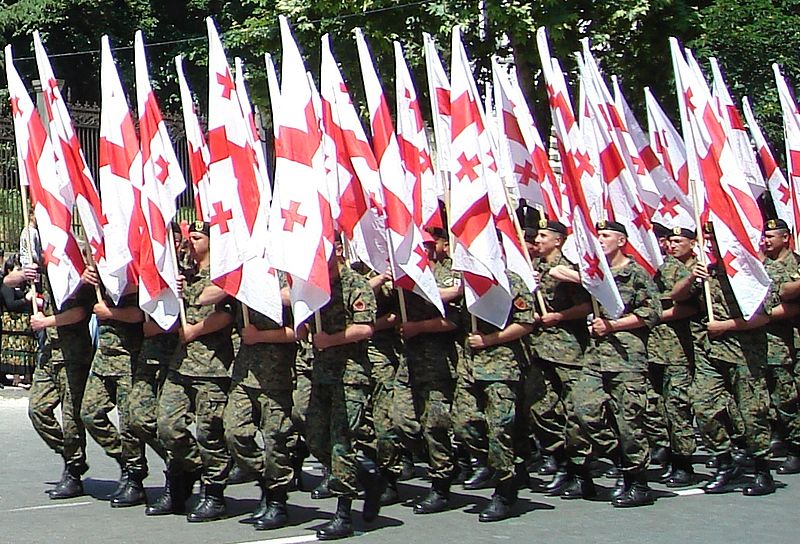We sit down with the founder of Georgian outlet Real Politika Zaza Abashidze, Georgian journalist Akaki Zarkua, and Georgian photographer and artist Tbel Abuseridze
for a deep dive into Georgia's protests against the "foreign agents" law and fallout of Russian mobilization refuseniks.
Watch the video:
This report was produced thanks to the support of Euromaidan Press patrons. To help us give you more unique insights about Russia's aggression and its repercussions internationally, consider becoming one of them on Patreon or with a one-time donation.
100,000 Russian relocated to Georgia in 2022 "to preserve their middle-class lifestyle" and "are not eager to talk about war"
Over 100,000 Russians came to Georgia in 2022, which is quite a huge number for a small country, especially given that Georgian second largest city Batumi has only 150,000 people.
Almost immediately, economic changes became visible in the country. Prices increased, and with too many Russians, the balance of the Georgian economy shifted. Real estate saw more than a 25% increase in the rental price, which became a burden for many Georgians living in Tbilisi.
Meanwhile, Zarkua says, "there are reasonable concerns that the Russians will replace the Georgian population as a new middle class as there are more high-income migrants, and many things are more accessible to them." Many Russians who relocated to Georgia are so-called "digital nomads." They can work everywhere because they work for companies outside of Russia and Georgia.
Most Georgians are saying they support some restrictions on border crossing for Russians. However, the current government of the Georgian Dream party, which has been long building a pro-Russian policy of the country, doesn't dare to make such steps.
"The political side of this immigration is also a concern… Many European countries closed their borders to Russian immigrants, so it was a question from Georgian society, why are we opening our borders to Russians?" Abashidze said.
Russians in Georgia are creating their "parallel society"
"People or the citizens of the imperialist countries generally don't tend to assimilate at all. So they always create their own bars, own kindergartens and everything their own. They are really living in their own bubbles. It's like they are a society within a society," Abuseridze told us about his experience.
The Russians left Russia en masse and moved to Georgia because they don't want to fight, they don't want to die but also they want to preserve their lifestyle, all speakers agree. While in Georgia, Russians are mostly trying not to talk about politics and abstain from any political activity.
"What was striking for me is that even though there was no meaningful anti-war movement in Russia, we didn't see any meaningful anti-war movement outside Russia organized by Russians," Zarkua emphasized. Abashidze also added, when asked about Russians' attitude to the war that "in general, they don't feel comfortable talking about the war."
On the other hand, some Russian citizens try to demonstrate their positions and are actively making art or protesting or even burning their passports in front of the Georgian parliament, Abuseridze stressed.
Why is the current Georgian government pro-Russian while society generally supports EU integration?
Georgian society is very pro-Ukrainian, all speakers told us. It is visible in the streets of Tbilisi, where one can find too many Ukrainian flags and stickers on the buildings, cars, and bags.
Georgian society is also practically supporting Ukraine. One of the latest examples was half a million dollars raised to buy the generators during the winter, and it was the initiative from the society.
On the other side, the Georgian government is trying to balance, Abashidze said, comparing its policy to the Hungarian policy of Victor Orban.
The Georgian Dream government was elected in 2012 as an opposition to the previous Saakashvili's government. The new government chose a more warm policy towards Russia.
Yet, the main shift happened right before the full-scale Russian attack on Ukraine in 2022, when the Georgian Dream government placed bets on Russia's fast and decisive victory in this war. It turned out that Ukraine successfully resisted, and the pre-war calculations turned out against the Georgian Dream.
The Georgian Dream government does not change its pro-Russian policy now because it's a "puppet government."
Essentially, the current Georgian government is controlled by the richest Georgian oligarch and former Prime Minister Bidzina Ivanishvili
.
"Basically, all power in Georgia is now in the hands of one man who is outside this legal system, and he doesn't hold any responsibility for it, formally," Zarkua said.
Ivanishvili's financial support was crucial for the party's winning elections and the current influence in the country's court and legal system. Ivanishvili's media control was also the key to limiting opposition.
On the other hand, society didn't create an organized oppositional party, while most of the oppositional forces are fragmented.
"But the main problem for Georgia for this moment, I think, is the lack of alternative opposition because our government did a pretty 'good' job in repressing alternatives, in terms of repressing peoples who disagreed on some policies," Abashidze said.

Former president Saakashvili made a lot of reforms and currently remains the leading opposition figure
Former Georgian president Mikheil Saakashvili made huge reforms and "basically transformed this failed state to a functional centralized country." He cleared the Georgian government and institutions of corruption. However, "there were also violations, for example, regarding human rights," Zarkua said, explaining why he lost elections in 2012. Still, "everyone agrees that he is right now a political prisoner," he added.
Saakashvili's party remains the second biggest party in Georgia, while other parties have two percent or three percent of the support in the elections. That is why Saakashvili's party remains the main challenging force of the current ruling party.
And this is a problem, our speakers said, hoping that current protests against the Georgian government and its law on the "foreign agents" will bring up some new leaders.
Could Georgia use the current moment to take back from Russia occupied Abkhazia and Ossetia
During the Russo-Georgian war, Russia occupied the Georgian regions of Abkhazia and Ossetia in 2008. In 2022, many Ukrainians hoped that Georgia would use the moment of Ukrainian resistance and take back Abkhazia and Ossetia, but it didn't happen.
The reasons why this didn't happen were the lack of capacity, Georgian state propaganda, as well as lack of public support for such a move, Zarkua explained.
On the one hand, the propaganda of the ruling party of Georgia during the last year was centered around the message that "the West and Ukraine are all trying to get us involved in this war. They want us to open a second front; they want our children to be killed," Zarkua recalled.
Also, Georgia signed agreements that it would not use force in this conflict, and it doesn't have the capability to do something like that.
Finally, this kind of resolution is not strongly demanded in Georgia's public opinion, Zarkua explained, but what was demanded was to improve positions on the negotiating table with Russia.
"For me, as a citizen of Georgia, the main problem is that we are losing this narrow window of opportunity," he concluded about governments' failure to work towards the return of Ossetia and Abkhazia.
"We have to resist. We have to beat authoritarian ruler. And basically, there are lessons from Ukraine. I think that would be useful for Georgian citizens and society right now," Zarkua concluded while speaking about current protests in Georgia against the adoption of the law on foreign agents and the government's general policy.
To find out more about these protests, listen:





